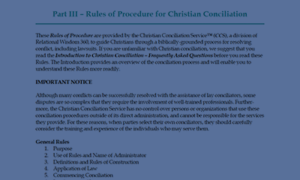Training Partner Resources
Downloads by Category
Mediation
- Mediation Process
- Mediation Agreement – Simplified
- Mediation Agreement
- Mediation Arbitration Agreement
- Mediation Guidelines for Discussion
- Mediation Agenda
Arbitration
- Arbitration Agreement
- How to Prepare for Christian Arbitration
- Ground Rules for Arbitration
- Guidelines for Presenting Information
- Witness Ground Rules
Equipping & Training
Recommended Reading
Books
- Anatomy of Peace, Arbinger Institute
- Choosing Forgiveness: Your Journey to Freedom,
Nancy Leigh DeMoss - Confession and Forgiveness, Ted Kober
- Discovering Relational Wisdom 2.0
Study Guide & Small Group Access - How People Change, Timothy S. Lane & Paul David Tripp
- Instruments in the Redeemer’s Hands, Paul David Tripp
- The Peacemaker, Ken Sande
Paperback | Audiobook | Student Edition - Peacemaking for Families, Ken Sande with Tom Raabe
- Peacemaking Women, Tara Klena Barthel & Judy Dabler
- Peacemaking Pastor, Alfred Poirier
- Redeeming Church Conflicts, Tara Klena Barthel & David V. Edling
- Relationships: A Mess Worth Making,
Timothy S. Lane & Paul David Tripp - Resolving Everyday Conflict, Ken Sande & Kevin Johnson
- Seeing with New Eyes, David Powlison
- Speaking Truth in Love, David Powlison
- Unpacking Forgiveness, Chris Brauns
- War of Words, Paul David Tripp
- When People Are Big and God is Small, Edward Welch
Equipping & Training
Beyond helping resolve current disputes, we seek to provide long-term conflict management skills that are consistent with biblical principles. Training sessions combine Relational Wisdom 360 materials with our peacemaking experience, knowledge, and skills. These are offered in a variety of formats including custom equipping sessions, seminars, workshops, retreats, and ongoing coaching.
Common Terms
Alternative Dispute Resolution
This is a general term for addressing and resolving conflicts such as monetary or legal claims that would otherwise be settled in a court or through secular mediation. Mediation is the first step, followed by arbitration if mediation is unsuccessful. The service helps the parties resolve the substantive issues while addressing the relational issues, seeking to preserve or repair the relationships broken due to the conflict. The mediation and arbitration process follow The Rules of Procedure for Christian Conciliation.
Arbitration
Arbitration is the process available in the event mediation does not resolve all of the material or substantive claims. It is a legally binding process, which follows The Rules of Procedure for Christian Conciliation. Arbitration is a cooperative, non-adversarial process that allows the parties to fully present their factual information and legal precedents and guidelines, with or without the assistance of attorneys. The Arbitrator renders a legally binding and enforceable decision.
Christian Conciliation
A process which assists individuals and groups to respond to and resolve challenging conflict. This process is rooted in the Gospel, providing assistance which is cooperative and encouraging and seeks to help parties to both reconcile relationships and resolve substantive issues. Conciliation is a broader term which incorporates conflict coaching, mediation, arbitration, and group facilitation.
Church/Organizational Assistance
This assistance provides a holistically designed process which starts with an assessment of the situation and need. It is based on the determined nature of the conflict, and may include introductory teaching of the principles guiding our work and the resolution of the conflicts. Included as well are in-depth coaching interviews with the individuals involved, assistance in mediating small and large group disagreements. It includes developing a plan and assistance reporting results to the larger membership if appropriate and the creation of a long term plan for future growth and creation of a culture of peace.
Conflict Coaching
A process where a conciliator helps individuals on one or both sides of the conflict prepare to have a beneficial conversation with one another. Participants are helped to evaluate the situation and their own roles in the conflict; then respond to the others involved in a way that glorifies God and encourages reconciliation.
Confidentiality
The parties and the conciliators must agree at the outset that, with few exceptions, the conciliators will not be asked to divulge information outside of the conciliation process or the ecclesiastical structure of the parties’ churches. In particular, they may not be subpoenaed to testify in subsequent legal proceedings (see Rules 16 and 17 of the Rules of Procedure). The parties are required to commit to not divulging information to people who do not have a necessary and legitimate interest in the conflict.
Intensive
An Intensive is a process used in relationships which will benefit from a focused, extended assistance in addressing the unresolved conflicts in the relationship. Intensives are designed to create a safe environment to address, in depth, the issues that create potential or experienced separation or loss of the marriage or family relationship. Couples and families work together with a conciliator(s) to reconcile relationships and develop a customized plan with the long-term goal of restoring peace and joy to the relationship. A plan usually includes steps for personal growth for those involved, improved communication goals and skills, and setting clear expectations and steps to accomplish mutually agreed upon goals. This is not deep counseling or psychotherapy; however, the agreed upon plan could include future counseling for issues that come to light during the conciliation process.
Mediation
Mediation is a process that assists two or more individuals in resolving a disagreement, dispute or relational breakdown between them. It addresses issues that are material and/or relational in nature, reconciling people and resolving the material or substantive disputes in a biblically faithful manner. It can be used to address conflicts when legal or formal steps are not even considered, or as an alternative to resolving disputes through the courts and/or secular alternative dispute resolution services.
The process is conciliatory rather than adversarial in nature, encouraging honest communication and reasonable cooperation rather than unnecessary contention and advocacy. The parties retain control and input into the outcome or settlement of their dispute. The mediator helps parties prepare and facilitates discussion and assists parties in following a process but does not negotiate or advocate for a particular settlement. The mediation is conducted according to the Rules of Procedure for Christian Conciliation, Rules 1 – 24.




